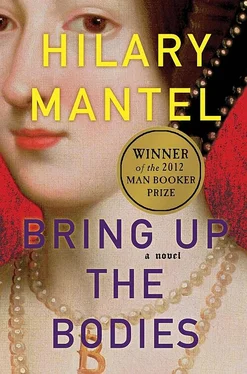She will die that day, she says. She has studied death, many times anticipated it, and she is not shy at its approach. She dictates her wishes about her burial arrangements, which she does not expect to be observed. She asks for her household to be paid off, her debts to be settled.
At ten in the morning a priest anoints her, touching the holy oil to her eyelids and lips, her hands and feet. These lids will now seal and not reopen, she will neither look nor see. These lips have finished their prayers. These hands will sign no more papers. These feet have finished their journey. By noon her breathing is stertorous, she is labouring to her end. At two o’clock, light cast into her chamber by the fields of snow, she resigns from life. As she draws her last breath, the sombre forms of her keepers close in. They are reluctant to disturb the aged chaplain, and the old women shuffling from her bedside. Before they have washed her, Bedingfield has put his fastest rider on the road.
8 January: the news arrives at court. It filters out from the king’s rooms then runs riot up staircases to the rooms where the queen’s maids are dressing, and through the cubby holes where kitchen boys huddle to doze, and along lanes and passages through the breweries and the cold rooms for keeping fish, and up again through the gardens to the galleries and bounces up to the carpeted chambers where Anne Boleyn sinks to her knees and says, ‘At last God, not before time!’ The musicians tune up for the celebrations.
Anne the queen wears yellow, as she did when she first appeared at court, dancing in a masque: the year, 1521. Everyone remembers it, or they say they do: Boleyn’s second daughter with her bold dark eyes, her speed, her grace. The fashion for yellow had started among the wealthy in Basle; for a few months, if a draper could get hold of it, he could make a killing. And then suddenly it was everywhere, in sleeves and hose and even hair-bands for those who couldn’t afford more than a sliver. By the time of Anne’s debut it had slid down the scale abroad; in the domains of the Emperor, you’d see a woman in a brothel hoisting her fat dugs and tight-lacing her yellow bodice.
Does Anne know this? Today her gown is worth five times the one she wore when her father was her only banker. It is sewn over with pearls, so that she moves in a blur of primrose light. He says to Lady Rochford, do we call it a new colour, or an old colour come back? Will you be wearing it, my lady?
She says, I don’t think it suits any complexion, myself. And Anne should stick to black.
On this happy occasion, Henry wants to show off the princess. You would think such a small child – she is now almost two and a half – would be looking about her for her nurse, but Elizabeth chuckles as she is passed hand-to-hand by the gentlemen, scuffing up their beards and batting at their hats. Her father bounces her in his arms. ‘She looks forward to seeing her little brother, don’t you, dumpling?’
There is a stir from the courtiers; all Europe knows Anne’s condition, but it is the first time it has been mentioned in public. ‘And I share her impatience,’ the king says. ‘It’s been long enough to wait.’
Elizabeth’s face is losing its baby roundness. Hail Princess Ferret Face. The older courtiers say they can see the king’s father in her, and his brother, Prince Arthur. She has her mother’s eyes though, busy and full in their orbits. He thinks Anne’s eyes beautiful, though best when they gleam with interest, as a cat’s do when she sees the whisk of some small creature’s tail.
The king seizes back his darling and coos to her. ‘Up to the sky!’ he says, and tosses her up, then swoops her down and plants a kiss on her head.
Lady Rochford says, ‘Henry has a tender heart, does he not? Of course, he is pleased with any child. I have seen him kiss a stranger’s baby in much the same way.’
At the first sign of fractiousness the child is taken away, wrapped tight in furs. Anne’s eyes follow her. Henry says, as if remembering his manners, ‘We must accept that the country will mourn for the dowager.’
Anne says, ‘They didn’t know her. How can they mourn? What was she to them? A foreigner.’
‘I suppose it is proper,’ the king says, reluctant. ‘As she was once given the title of queen.’
‘Mistakenly,’ Anne says. She is relentless.
The musicians strike up. The king tows Mary Shelton into the dance. Mary is laughing. She has been missing this last half hour, and now she’s pink-cheeked, her eyes brilliant; no mistaking what she’s been doing. He thinks, if old Bishop Fisher could see this kick-up, he would think the Antichrist has arrived. He is surprised to find himself, even for a moment, viewing the world through Bishop Fisher’s eyes.
On London Bridge after his execution, Fisher’s head remained in such a state of preservation that the Londoners began to talk of a miracle. Eventually he had the bridge keeper pull it down and drop it in a weighted sack into the Thames.
At Kimbolton, Katherine’s body has been turned over to the embalmers. He imagines a rustle in the dark, a sigh, as the nation arranges itself to pray. ‘She sent me a letter,’ Henry says. He slides it from among the folds of his yellow jacket. ‘I don’t want it. Here, Cromwell, take it away.’
As he folds it he glances at it: ‘ And lastly I make this vow, that mine eyes desire you above all things. ’
After the dancing, Anne calls him in. She is sombre, dry, attentive: all business. ‘I wish to make my thoughts known to Lady Mary the king’s daughter.’ He notes the respectful address. It isn’t ‘the Princess Mary’. But it isn’t ‘the Spanish bastard’ either. ‘Now that her mother is gone and cannot influence her,’ Anne says, ‘we may hope she will be less stiff in maintaining her errors. I have no need to conciliate her, God knows. But I think if I could put an end to the ill-feeling between the king and Mary, he would thank me for it.’
‘He would be beholden to you, madam. And it would be an act of charity.’
‘I wish to be a mother to her.’ Anne flushes; it does sound unlikely. ‘I do not expect her to call me “my lady mother”, but I expect her to call me Your Highness. If she will conform herself to her father I shall be pleased to have her at court. She will have an honoured place, and not much below mine. I shall not expect a deep reverence from her, but the ordinary form of courtesy which royal persons use among themselves, within their families, the younger to the elder. Assure her, I shall not make her carry my train. She will not have to sit at table with her sister the Princess Elizabeth, so no question of her lower rank will arise. I think this is a fair offer.’ He waits. ‘If she will render me the respect which is my due, I shall not walk before her on ordinary occasions, but we will walk hand in hand.’
For one so tender about her dignities as Anne the queen, it is an unparalleled set of concessions. But he imagines Mary’s face when it is put to her. He is glad he will not be there to see it in person.
He makes a respectful good night, but Anne calls him back. She says, in a low voice: ‘Cremuel, this is my offer, I will go no further. I am resolved to make it and then I cannot be blamed. But I do not think she will take it, and then we will both be sorry, for we are condemned to fight till the breath goes out of our bodies. She is my death, and I am hers. So tell her, I shall make sure she does not live to laugh at me after I am gone.’
He goes to Chapuys’s house to pay his condolences. The ambassador is wrapped in black. A draught is cutting through his rooms that seems to blow straight from the river, and his mood is one of self-reproach. ‘How I wish I had not left her! But she seemed better. She sat up that morning and they dressed her hair. I had seen her eat some bread, a mouthful or two, I thought that was an advance. I rode away in hope, and within hours she was failing.’
Читать дальше
Конец ознакомительного отрывка
Купить книгу












